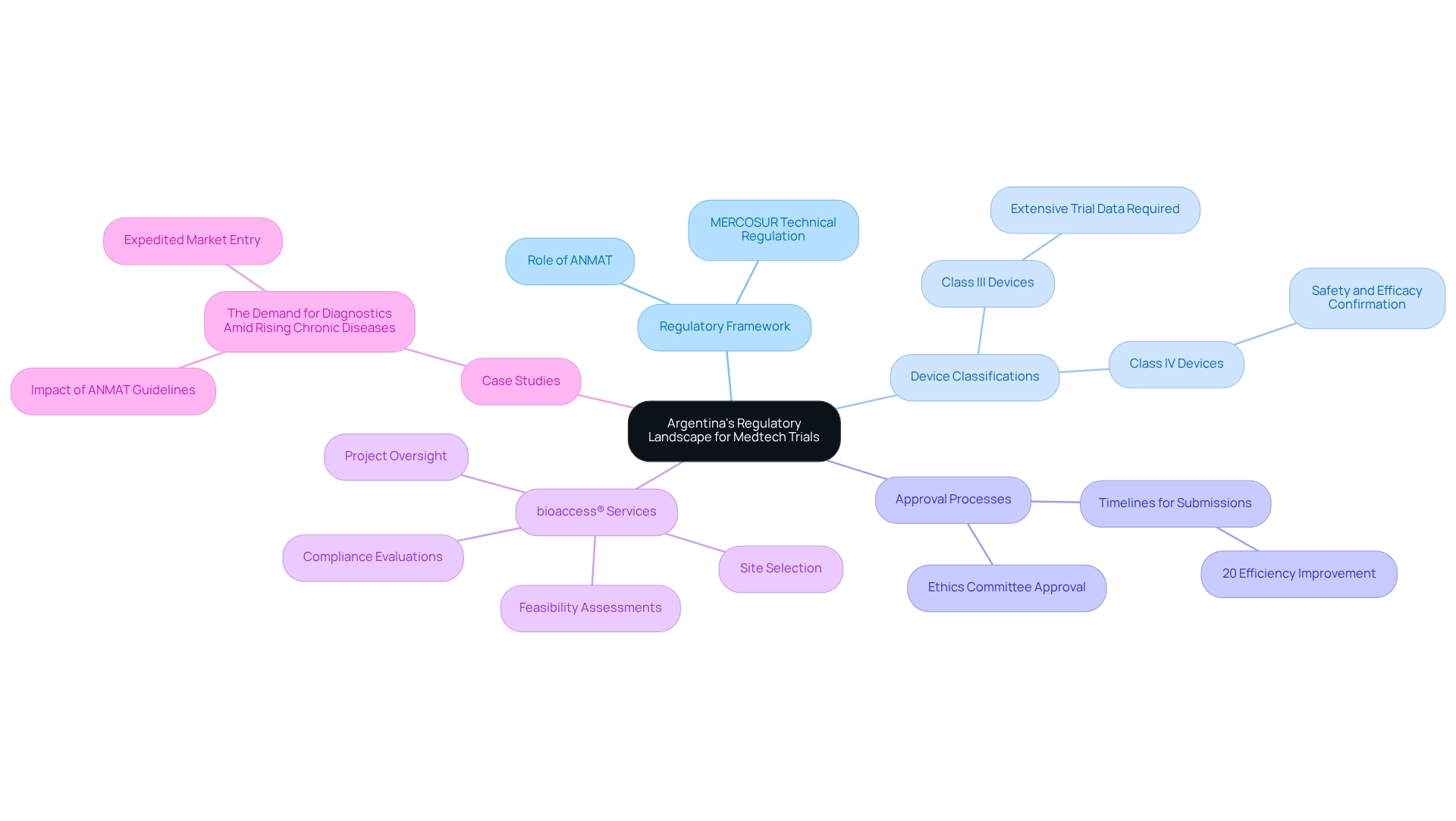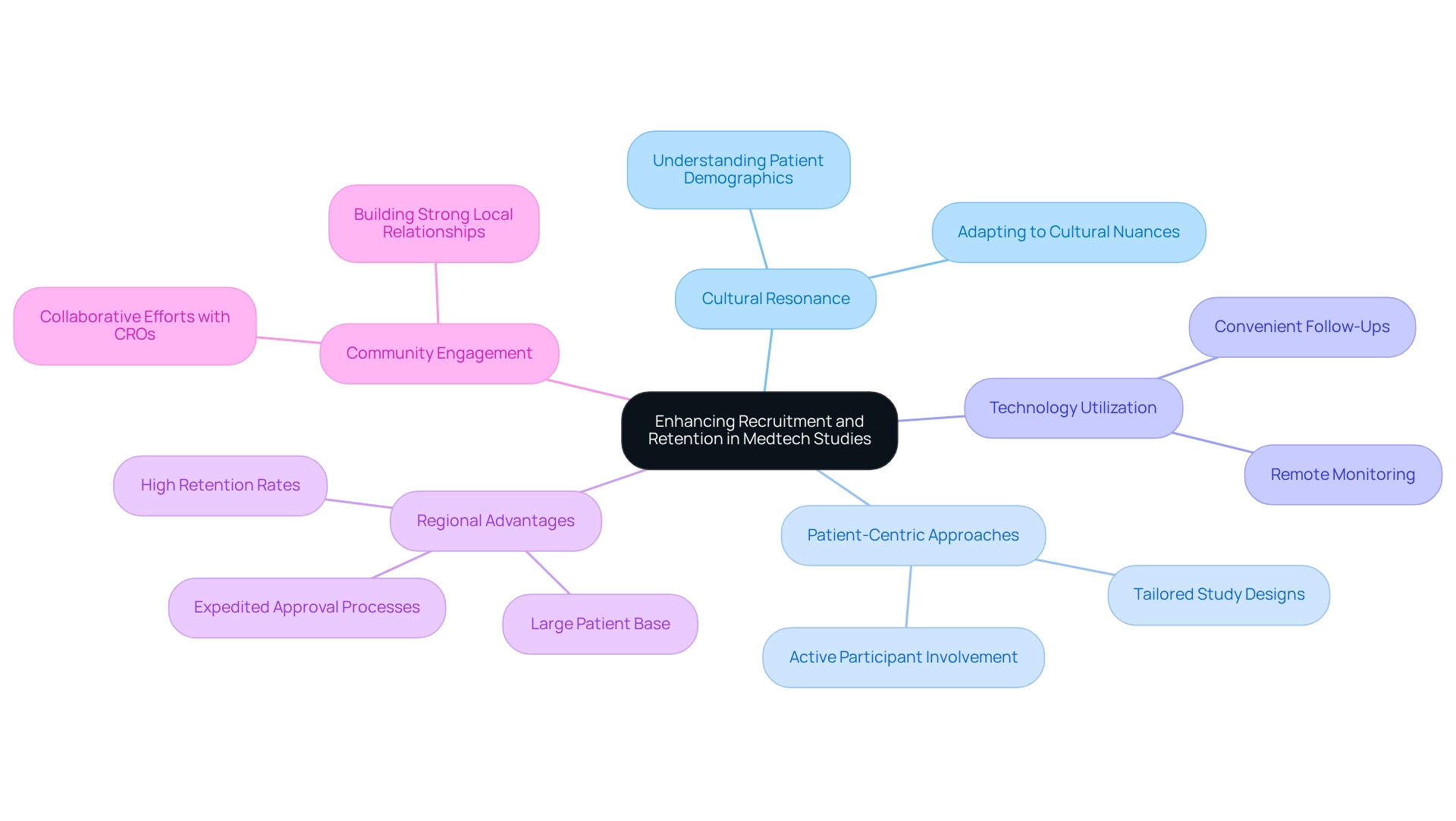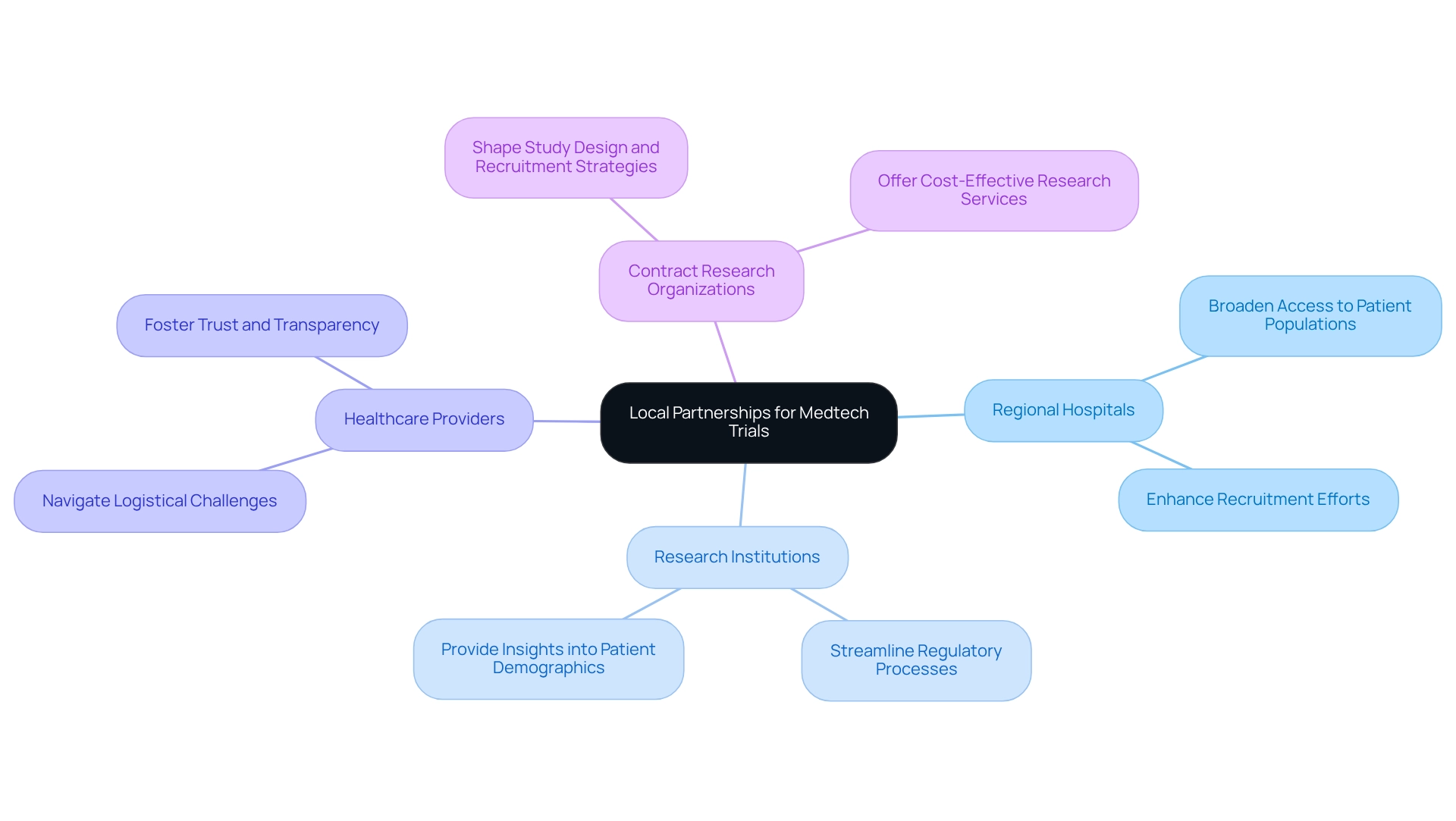Overview
Argentina-specific medtech trial strategies are pivotal in navigating the regulatory landscape, enhancing recruitment and retention through culturally tailored designs, and establishing local partnerships to improve execution.
Understanding ANMAT regulations is crucial, as it allows for the incorporation of patient-centric approaches that resonate with local populations.
Collaborating with local organizations not only facilitates compliance but also enhances the overall efficacy of clinical studies.
These elements are essential for achieving efficient processes and better outcomes in Argentina's evolving healthcare environment.
As the medtech landscape continues to grow, the importance of these strategies cannot be overstated, underscoring the need for robust partnerships and a deep understanding of local dynamics.
Introduction
Navigating the complex landscape of medical technology trials in Argentina requires a deep understanding of the regulatory framework and strategic collaboration. With the National Administration of Drugs, Food and Medical Technology (ANMAT) at the helm, researchers must adapt to evolving regulations, particularly as the demand for innovative diagnostic solutions grows. Recent regulatory advancements suggest a more streamlined approval process; however, the path to successful trials is fraught with challenges.
By embracing culturally tailored trial designs and forming local partnerships, Medtech companies can enhance recruitment and retention, ultimately leading to more successful outcomes. This article delves into the essential strategies for optimizing clinical trials in Argentina, highlighting the importance of:
- Compliance
- Community engagement
- Collaboration in advancing medical technology.
Understand Argentina's Regulatory Landscape for Medtech Trials
Argentina's regulatory framework for Medtech studies is primarily overseen by the National Administration of Drugs, Food and Medical Technology (ANMAT). Researchers must familiarize themselves with essential regulations, particularly the approval processes for medical trials, which differ based on device classification. For instance, Class III and IV devices require extensive trial data to confirm safety and efficacy before approval.
Understanding the timelines for regulatory submissions and the critical role of Ethics Committee approval is vital for Argentina-specific medtech trial strategies, especially with recent developments like the introduction of the MERCOSUR Technical Regulation for medical products, which highlight the importance of adhering to international standards. In 2025, data from the Country Health Profiles show that the approval process for research studies in Argentina has become more efficient, with ANMAT's review timelines enhancing by roughly 20% compared to earlier years. This enhancement is essential as the need for sophisticated diagnostic solutions grows, propelled by the rising incidence of chronic illnesses and age-associated conditions.
bioaccess® provides extensive study management services, including feasibility assessments, site selection, compliance evaluations, setup, import permits, project oversight, and reporting. Their expertise in managing Early-Feasibility Studies (EFS), First-In-Human Studies (FISH), Pilot Studies, Pivotal Studies, and Post-Market Clinical Follow-Up Studies (PMCF) positions them as a leader in navigating the complexities of clinical research in Argentina.
Case studies illustrate the impact of these regulations on study outcomes. For instance, a recent study titled 'The Demand for Diagnostics Amid Rising Chronic Diseases' highlighted how adherence to ANMAT's guidelines enabled a successful evaluation for a Class III device, resulting in expedited market entry. By effectively navigating these regulatory landscapes, researchers can mitigate risks and significantly enhance the likelihood of successful study outcomes through Argentina-specific medtech trial strategies, ultimately advancing medical technology in Argentina and contributing to job creation, economic growth, and healthcare improvement.

Develop Tailored Trial Designs to Enhance Recruitment and Retention
To enhance recruitment and retention in Medtech studies, it is imperative to develop research that resonates culturally and contextually. This requires a comprehensive understanding of patient demographics, regional healthcare practices, and the critical role of community engagement. By implementing patient-centric approaches—where participants are actively involved in the design process—researchers can significantly boost enrollment and retention in studies.
Moreover, leveraging technology for remote monitoring and follow-ups alleviates the burden on participants, thereby making participation more convenient. Successful experiments in Argentina-specific Medtech trial strategies have demonstrated that integrating local insights into study design not only elevates recruitment rates but also enriches the data collected, resulting in more robust and reliable outcomes. For instance, studies that adapt to the cultural nuances of the population have reported higher retention rates, underscoring the effectiveness of these tailored strategies.
In addition, Latin America offers distinct advantages for medical research, including a substantial patient base and elevated retention rates, further highlighting the need for culturally appropriate study designs. The regulatory landscape in many low- and middle-income countries (LMICs) is often less stringent than that of the U.S., leading to expedited approval processes that facilitate these culturally adapted studies. As Julio G. Martinez-Clark noted, the Colombian administration is actively working to attract more medical studies, reflecting a regional initiative to enhance research capabilities.
Furthermore, bioaccess®, a leading contract research organization (CRO), has developed expertise in navigating the compliance environment, often achieving quicker review timelines due to strong community connections. This is crucial for effective recruitment and retention strategies, particularly in Argentina-specific Medtech trial strategies, as evidenced by Dr. John B. Simpson's favorable experience with Avinger's OCT-guided atherectomy research in Cali, Colombia, which showcases the collaborative efforts of LATAM CRO experts.

Establish Local Partnerships to Strengthen Trial Execution
Establishing collaborations with regional hospitals, research institutions, and healthcare providers is crucial for implementing Argentina-specific medtech trial strategies in clinical studies. These partnerships not only broaden access to diverse patient populations but also enhance recruitment efforts and streamline regulatory processes. Local partners possess a nuanced understanding of the healthcare landscape, enabling them to effectively navigate logistical challenges.
For instance, collaborating with a regional contract research organization (CRO) can provide essential insights into patient demographics and preferences, shaping study design and recruitment strategies. Statistics indicate that bioaccess® assists Medtech startups with affordable, high-quality research services, underscoring the importance of local collaborations. Successful case studies, such as the partnership between bioaccess™ and Caribbean Health Group, which positioned Barranquilla as a leading destination for medical studies in Latin America, demonstrate the effectiveness of strategic alliances in overcoming challenges faced by medical device startups, including regulatory hurdles and recruitment issues.
Moreover, bioaccess®'s dedication to data security guarantees that client issues are handled with adherence to regulations and transparency, nurturing confidence in the research process. As highlighted by Precision for Medicine, 'Observe how our ongoing acknowledgment in the industry emphasizes our dedication to excellence in clinical trial management,' reinforcing the significance of quality in clinical trial execution through regional collaborations. In 2025, leveraging these local partnerships will be pivotal for Medtech startups aiming to capitalize on Argentina-specific medtech trial strategies, given the country's rich patient pool and dynamic healthcare environment.

Conclusion
Navigating the regulatory landscape for medical technology trials in Argentina necessitates a multifaceted approach that underscores compliance, community engagement, and strategic collaboration. A thorough understanding of ANMAT's regulations is essential for researchers seeking to optimize their clinical trial processes. With recent enhancements in approval timelines and adherence to international standards, Medtech companies now have the opportunity to achieve expedited market entry while advancing healthcare solutions.
Tailoring trial designs to align with the cultural and contextual realities of the Argentine population is critical for improving recruitment and retention rates. By implementing patient-centric approaches and utilizing technology for convenience, researchers can significantly boost participant engagement. Successful trials have shown that culturally relevant designs not only yield higher enrollment rates but also produce more reliable data, leading to superior outcomes.
Establishing local partnerships with hospitals, research institutions, and healthcare providers further fortifies the execution of clinical trials. These collaborations grant access to diverse patient populations and deepen the understanding of local healthcare dynamics. Successful case studies illustrate that leveraging local expertise can alleviate logistical challenges and build trust in the trial process.
In conclusion, adopting a comprehensive strategy that encompasses regulatory compliance, culturally tailored trial designs, and robust local partnerships is imperative for Medtech companies in Argentina. By prioritizing these elements, researchers can significantly enhance their chances of success in clinical trials, drive innovation, and ultimately improve health outcomes for the community.
Frequently Asked Questions
Who oversees the regulatory framework for Medtech studies in Argentina?
The regulatory framework for Medtech studies in Argentina is primarily overseen by the National Administration of Drugs, Food and Medical Technology (ANMAT).
What is important for researchers to know regarding medical trials in Argentina?
Researchers must familiarize themselves with essential regulations, particularly the approval processes for medical trials, which vary based on device classification.
What are the requirements for Class III and IV medical devices in Argentina?
Class III and IV devices require extensive trial data to confirm their safety and efficacy before they can receive approval.
Why is understanding the timelines for regulatory submissions important in Argentina?
Understanding the timelines for regulatory submissions is vital for developing Argentina-specific medtech trial strategies, especially considering the role of Ethics Committee approval.
What recent developments have affected the regulatory environment for medical products in Argentina?
The introduction of the MERCOSUR Technical Regulation for medical products has highlighted the importance of adhering to international standards.
How has the efficiency of the approval process for research studies in Argentina changed?
As of 2025, the approval process for research studies in Argentina has become more efficient, with ANMAT's review timelines improving by approximately 20% compared to earlier years.
What services does bioaccess® provide for Medtech studies?
bioaccess® offers extensive study management services, including feasibility assessments, site selection, compliance evaluations, setup, import permits, project oversight, and reporting.
What types of studies does bioaccess® manage?
bioaccess® manages Early-Feasibility Studies (EFS), First-In-Human Studies (FISH), Pilot Studies, Pivotal Studies, and Post-Market Clinical Follow-Up Studies (PMCF).
Can you provide an example of how regulations impact study outcomes in Argentina?
A recent study titled 'The Demand for Diagnostics Amid Rising Chronic Diseases' demonstrated that adherence to ANMAT's guidelines enabled a successful evaluation for a Class III device, resulting in expedited market entry.
How can researchers enhance the likelihood of successful study outcomes in Argentina?
By effectively navigating the regulatory landscapes and adhering to Argentina-specific medtech trial strategies, researchers can mitigate risks and significantly enhance the likelihood of successful study outcomes.




